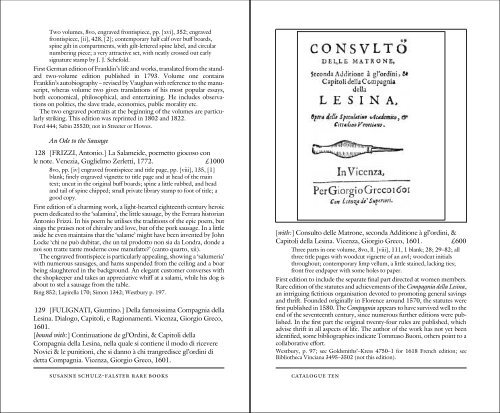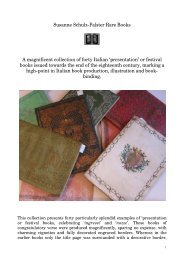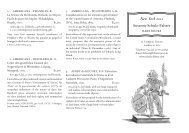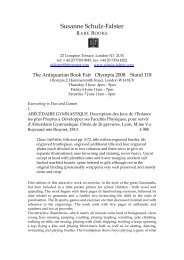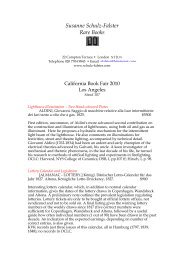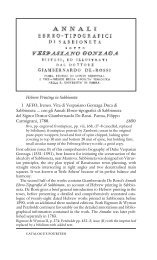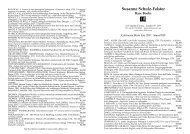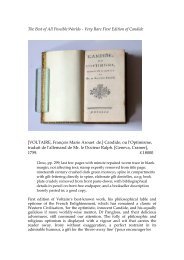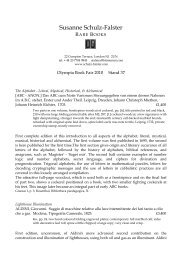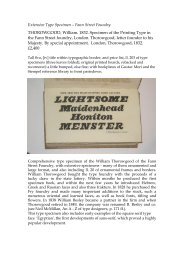Susanne Schulz-Falster Catalogue Ten - Schulz-Falster Rare Books
Susanne Schulz-Falster Catalogue Ten - Schulz-Falster Rare Books
Susanne Schulz-Falster Catalogue Ten - Schulz-Falster Rare Books
Create successful ePaper yourself
Turn your PDF publications into a flip-book with our unique Google optimized e-Paper software.
Two volumes, 8vo, engraved frontispiece, pp. [xvi], 352; engraved<br />
frontispiece, [ii], 428, [2]; contemporary half calf over buV boards,<br />
spine gilt in compartments, with gilt-lettered spine label, and circular<br />
numbering piece; a very attractive set, with neatly crossed out early<br />
signature stamp by J. J. Schefold.<br />
First German edition of Franklin’s life and works, translated from the standard<br />
two-volume edition published in 1793. Volume one contains<br />
Franklin’s autobiography – revised by Vaughan with reference to the manuscript,<br />
wheras volume two gives translations of his most popular essays,<br />
both economical, philosophical, and entertaining. He includes observations<br />
on politics, the slave trade, economics, public morality etc.<br />
The two engraved portraits at the beginning of the volumes are particularly<br />
striking. This edition was reprinted in 1802 and 1822.<br />
Ford 444; Sabin 25520; not in Streeter or Howes.<br />
An Ode to the Sausage<br />
128 [FRIZZI, Antonio.] La Salameide, poemetto giocoso con<br />
le note. Venezia, Guglielmo Zerletti, 1772. £1000<br />
8vo, pp. [iv] engraved frontispiece and title page, pp. [viii], 135, [1]<br />
blank; Wnely engraved vignette to title page and at head of the main<br />
text; uncut in the original buV boards; spine a little rubbed, and head<br />
and tail of spine chipped; small private library stamp to foot of title; a<br />
good copy.<br />
First edition of a charming work, a light-hearted eighteenth century heroic<br />
poem dedicated to the ‘salamina’, the little sausage, by the Ferrara historian<br />
Antonio Frizzi. In his poem he utilises the traditions of the epic poem, but<br />
sings the praises not of chivalry and love, but of the pork sausage. In a little<br />
aside he even maintains that the ‘salame’ might have been invented by John<br />
Locke ‘chi ne può dubitar, che un tal prodotto non sia da Londra, donde a<br />
noi son tratte tante moderne cose manufatte?’ (canto quarto, xii).<br />
The engraved frontispiece is particularly appealing, showing a ‘salumeria’<br />
with numerous sausages, and hams suspended from the ceiling and a boar<br />
being slaughtered in the background. An elegant customer converses with<br />
the shopkeeper and takes an appreciative whiV at a salami, while his dog is<br />
about to stel a sausage from the table.<br />
Bing 852; Lapirella 170; Simon 1342; Westbury p. 197.<br />
129 [FULIGNATI, Giuntino.] Della famosissima Compagnia della<br />
Lesina. Dialogo, Capitoli, e Ragionamenti. Vicenza, Giorgio Greco,<br />
1601.<br />
[bound with:] Continuatione de gl’Ordini, & Capitoli della<br />
Compagnia della Lesina, nella quale si contiene il modo di ricevere<br />
Novici & le punitioni, che si danno à chi trangredisce gl’ordini di<br />
detta Compagnia. Vicenza, Giorgio Greco, 1601.<br />
susanne schulz-falster rare books catalogue ten<br />
[with:] Consulto delle Matrone, seconda Additione à gl’ordini, &<br />
Capitoli della Lesina. Vicenza, Giorgio Greco, 1601. £600<br />
Three parts in one volume, 8vo, ll. [viii], 111, 1 blank; 28; 29–82; all<br />
three title pages with woodcut vignette of an awl; woodcut initials<br />
throughout; contemporary limp vellum, a little stained, lacking ties;<br />
front free endpaper with some holes to paper.<br />
First edition to include the separate Wnal part directed at women members.<br />
<strong>Rare</strong> edition of the statutes and achievements of the Compagnia della Lesina,<br />
an intriguing Wctitious organisation devoted to promoting general savings<br />
and thrift. Founded originally in Florence around 1570, the statutes were<br />
Wrst published in 1580. The Compagnia appears to have survived well to the<br />
end of the seventeenth century, since numerous further editions were published.<br />
In the Wrst part the original twenty-four rules are published, which<br />
advise thrift in all aspects of life. The author of the work has not yet been<br />
identiWed, some bibliographies indicate Tommaso Buoni, others point to a<br />
collaborative eVort.<br />
Westbury, p. 97; see Goldsmiths’–Kress 4750–1 for 1618 French edition; see<br />
Bibliotheca Vinciana 3495–3502 (not this edition).


